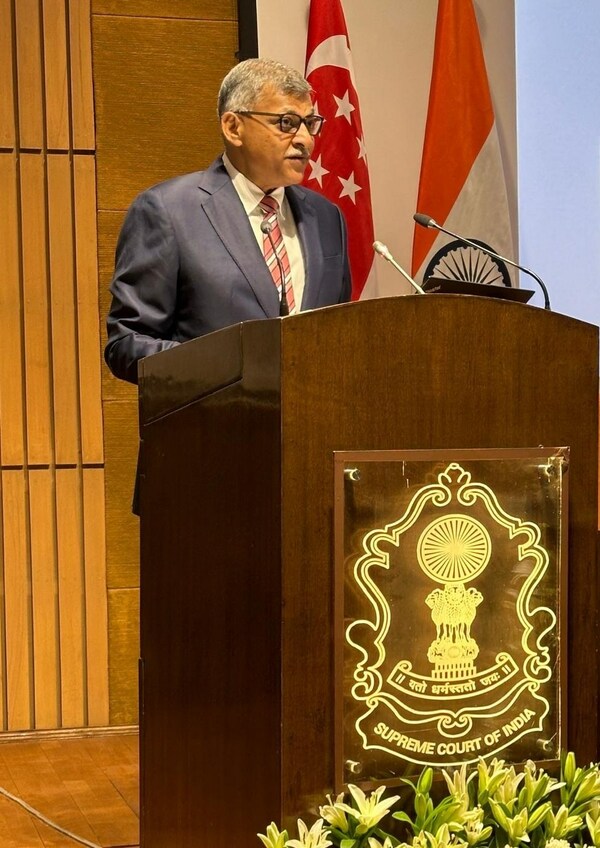SINGAPORE, April 15, 2024 /PRNewswire/ -- The Supreme Court of Singapore and the Supreme Court of India organised the inaugural Singapore-India Conference on Technology on 13 and 14 April 2024 in India. The Conference brought together not just judges from the two judiciaries, but also facilitated dialogue with experts in technology and its growing interface with justice systems. The idea of a conference on cutting-edge legal issues was mooted by The Honourable the Chief Justice Sundaresh Menon of Singapore and the Chief Justice of India, The Honourable Dr Justice D Y Chandrachud.

Photo caption: Chief Justice Sundaresh Menon delivering his Keynote Speech at the inaugural Singapore-India Conference on Technology
Chief Justice Menon delivered the Keynote Speech titled "Judicial Responsibility in the Age of Artificial Intelligence". In his speech, Chief Justice Menon noted that developments in generative artificial intelligence ("AI") have reshaped conversations about what the societies and systems of the future will look like, and that the courts stand on the cusp of seismic shifts that will affect our justice systems. Chief Justice Menon said that the courts must be guided above all by the goal of preserving and strengthening the rule of law. This goal should guide how the judiciaries discharge their traditional adjudicative role and systemic role, which is emerging with rapid and growing significance to ensure that the rule of law is not displaced by the "rule of technology" in this age of AI.
Chief Justice Menon suggested that the possibility of "AI judges" replacing human judges is a distant, even remote one. He said that, given the weight and implications of many of the decisions judges make, there are aspects of both the process and the outcomes of judging that, at least in certain fields, AI should not replace. However, the role of the human judge needs to evolve. Beyond cultivating technological expertise in using AI tools, judges must also remain committed to their professional duties and their ethical responsibilities to exercise judgment in managing both the process and the outcomes of judging in each case. The efforts of individual judges should be complemented by systemic initiatives undertaken by the judiciaries. There is an urgent need to develop robust AI governance frameworks and guidelines to regulate the use of AI in litigation and adjudication.
Domain experts in the field of AI and its impact on the justice system were invited to speak at the Conference, which may take place periodically, alternating between India and Singapore. Prof Urs Gasser and Prof Richard Susskind shared their views on the likely trajectory of the use of AI in the practice of law, potential blind spots, and important considerations for the judiciary.
Discussion themes that included "AI Assisting the Work of the Courts", "Harnessing AI Technology to Promote Access to Justice" and "Ethical Issues and Risk in the Use of AI" were chosen to generate discussion and new proposals to prepare both judiciaries to deal with issues that will affect the administration of justice.
Visit News and speeches (judiciary.gov.sg) for more details.
source: Supreme Court of Singapore
【與拍賣官看藝術】東南亞藝術市場是下一個熱點?一探各地獨特及吸引之處!► 即睇































